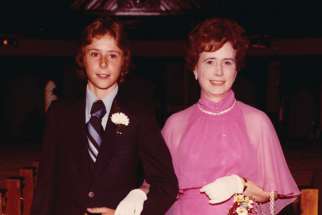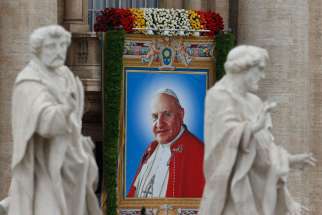Bob Brehl: Life and times of a Canadian knight named Day
Robert Brehl: Robert F. Kennedy's speech resonates in today's world
Off Ireland's beaten track
DROGHEDA, Ireland - Beyond the must-see sites and attractions like the Cliffs of Moher, Giant’s Causeway and the Guinness warehouse, there are many places in Ireland that are overlooked by tourists.
My most memorable Christmas gift
At a recent dinner party, talk turned to most memorable Christmas gifts received. There was a first bicycle, some jewelry and a couple “bucket-list” trips mentioned.
Non-celebrity is worth celebrating
So often we hear and read about the lives of the rich, powerful and famous. Celebrity seems to rule our culture.
But reflection on the lives of the ordinary, the everyday, the taken-for-granted, is often far more illuminating. If we look beyond the glitz we can see the real stars, the real world, and answers to some of the real questions.
No place for state in personal beliefs of nation
Just before Christmas, 1967, then-justice minister Pierre Trudeau famously said: “There’s no place for the state in the bedrooms of the nation.”
John XXIII, the witty saint
Pope John XXIII’s ascension to saint status, along with Pope John Paul II, sent me on a quest to find some of the new St. John XXIII’s wittiest remarks.
Humility, humour and simple kindness in Francis
Like most everyone, I’ve been fascinated and delighted with the election of Pope Francis. His simple, gracious acts during his first days on the job bode well for the Church.
Gun control underlines neighbourly differences
About a decade ago, I was in Scotland and one person after another whom I met kept referring to me as an American, presumably because of my accent.
Here’s to ‘Corry’ and the many good priests
Fr. Raymond Corriveau was one of the best
This week marks the second anniversary of the passing of one of the finest priests — make that people — I have had the good fortune to know, Fr. Raymond Corriveau.
Some readers may have known “Corry” through his work with the Redemptorists, but many readers probably don’t know the name. And that’s a shame. Not necessarily for Corry’s sake because he was remarkably humble for someone with such remarkable talent. But it’s a shame for the sake of the priesthood and the Church that he and others like him aren’t better known.
We hear all too often about the bad priests who have done notorious things, especially when it comes to child abuse. We hear the tasteless jokes about priests. We hear about the Church hierarchy’s ham-fisted handlings of past scandals. We hear all the bad stuff and it affects us all.
But we don’t necessarily hear about the really good priests — and there are many — who are quietly going about their business, doing good things day after day, and living up to the teachings of Jesus. Here is Corry’s story, or more rightly, a tiny slice of a life that was lived well with positive impact on so many.
Corry was born in 1936 near Woodstock, Ont., where he grew up until leaving to study to become a Redemptorist priest. He was ordained in 1962 and quickly made his mark for helping the poor and disenfranchised when he and two others started a pastoral ministry in a poor area of Montreal.
In the 1970s, he was appointed the Redemptorists’ “Novice Master” or mentor for young men interested in becoming priests. My brother, Michael, was one of Corry’s charges and they continued a close friendship, with the student counting on the teacher’s wisdom and guidance until Corry’s last day. It was in the 1970s that Corryentered our family’s lives on a regular basis, usually on a weekend afternoon for a drink with my father, an inevitable debate about some weighty matter, and dinnerwith us.
Two things stick out about Corry: his incredibly sharp mind with a depth of knowledge that seemed bottomless and his smiling eyes that could light up a room.
On the first matter, the good-natured debates with dad (who was no intellectual slouch himself) were both entertaining and educational for teenage ears and eyes. On the latter, Corry had this flawless ability to make everyone around him feel special. Later, in the 1980s when my mother was sick and the chemotherapy was zapping her energy, I can remember Corry dropping by the house and mom would literally light up and one could feel her rejuvenated energy, if only for that afternoon.
For such a smart person, it was natural that Corry’s career would thrust forward and move him up the ranks, eventually to lead the Redemptorists in Canada. But it was his pastoral caring at various parishes — from St. Patrick’s in Toronto and St. Alphonsus in Peterborough to St. Teresa’s in St. John’s and Holy Redeemer in Sudbury — that touched so many lives.
Corry had that ability to make you feel good, even if you didn’t really feel good. It was a wonderful gift which he freely gave.
Years later, when he was sick, I went to visit him at the Redemptorist headquarters in Toronto. I had not seen him for a long time. We sipped tea and sat and talked for well over an hour. I remember the length of time because my teenage son was waiting in the car playing an electronic game.
When I returned to the car, my son looked at me and said: “What’s so funny, dad? Why are you smiling?”
“I didn’t realize I was smiling,” I said. “I can’t explain it, but every time I see Corry, he makes me feel good, he lifts my spirits.”
Some months later, and only days before his death, I visited him in hospital with my brother. His eyes weren’t as smiling, but his mind was still incredibly sharp which surprised me because brain cancer was killing him.
At one point, a third priest entered the room and a deep theological discussion began. For me, they might as well have been talking in Aramaic because the topic was so over my head, but for Corry it was no problem to follow along and add insight to the discussion.
A few times, he would break away from the talk and pray, urging God to take him because he was ready. His faith was so deep; he was so dignified in his submission to God’s will. I can only hope I have a modicum as much when my time comes.
Telling Corry’s story in no way erases past crimes by other priests. I cannot even imagine the pain their victims live with each and every day. These “preying priests” will be punished on Earth and beyond. But telling Corry’s story, I hope, shows that the priesthood as a whole should not be painted with one brush and mocked with tasteless jokes. There are many other “Corrys” out there right now doing good deeds; true praying priests who deserve our support.
The Greeks get it when it comes to love
My wife and I were at a wonderful wedding on the Labour Day weekend.
The weather was superb. The setting in Muskoka was spectacular. The love emanating around the happy couple was undeniable. And the sermon during the ceremony on the shores of Lake Rosseau was thought-provoking. So much so, that I am still thinking about it.
Maybe I am thinking about it because we’re celebrating an anniversary on Sept. 24. It is our 24th anniversary: 24 on 24. How special is that for a red-blooded Canadian guy? Women may expect jewelry or other trinkets on milestone anniversaries like five, 10 or 20 years, but celebrating your two-four on the two-four? (I digress, even though the perfect gift from her would be a lot less expensive than most of the anniversary gifts I’ve bought her over the years and it comes in bottles or cans.)
But getting back to the wedding, it involved the daughter of two very close friends and it was the first wedding we’ve attended of friends’ children. So, we’ve officially moved into the next generation: the “parents’ generation.” Age certainly does creep up on you and years meander past.
The pastor who delivered the sermon is the bride’s grandfather. How cool is that having your grandpa take you from his lap not that long ago to presiding over your wedding?
So, of course, an emotional sap like me was set up for a head-spinning afternoon right from the get go.
The pastor spoke about the word love and that in English we use it so many different ways, such as “I love you” or “I love ice cream” or “I love that car.” Love is such a complicated word in English, he said, because it means different things. One does not love ice cream the same way one loves her children, or one does not love a car the same way one loves his wife. (Well, if he does, you know such a marriage is doomed.)
But the Greeks, he said, figured it out when it comes to love. The Greek language uses different words for love depending on which type of love.
Eros, or the more modern erotas, is a love of passion, romantic love. However, eros does not necessarily have to be sexual. (Plato redefined the word and that’s where “Platonic friendship” comes from.) But it is a very deep sense of love between humans.
Then there is philia, which applies to friendship, family, community. Philia is about kinship and camaraderie. Hence, Philadelphia (from Greek words) is called the city of brotherly love, even if it doesn’t feel that way at sporting events.
The third Greek love word is agape, which is used 250 times in the New Testament. Agape is love which is of and from God, whose very nature is love itself. As John writes in his Gospel: “Whoever does not love does not know God, because God is love.” God does not merely love; He is love itself. Everything God does flows from His love.
As I sat there at this wedding, listening and thinking, it dawned on me that God’s love is not sappy or sentimental, even if I am sappy and sentimental. It is something so much deeper.
We’ve all been to weddings with sermons like this, but this one really stuck with me. Perhaps it was because it was my friend’s dad talking, maybe it was because our anniversary was coming up, or maybe it was because I had a life-threatening scare recently. Whatever the reason, I thanked God for the love I have in my life and remembered a story, often attributed to Winston Churchill, although I am not sure it was he who came up with it originally. A man was asked on his death bed whom would he choose to come back as if given the chance to return to Earth. He answered quickly and unequivocally: “As my wife’s second husband.”
Eros and philia may be reasons he chose that response, but surely agape played a role.
(Brehl is a writer in Port Credit, Ont., and can be reached at bob@abc2.ca.)







